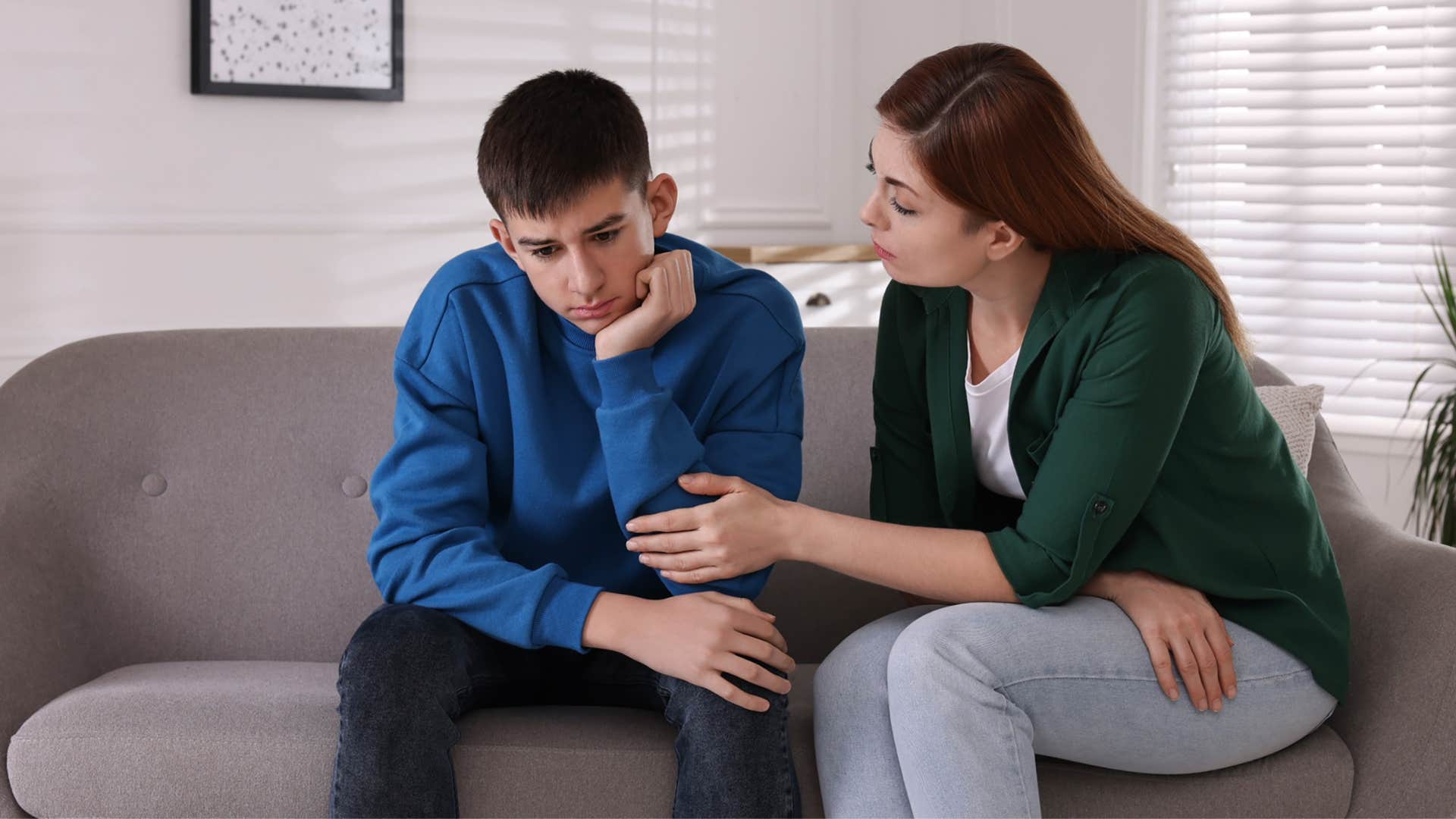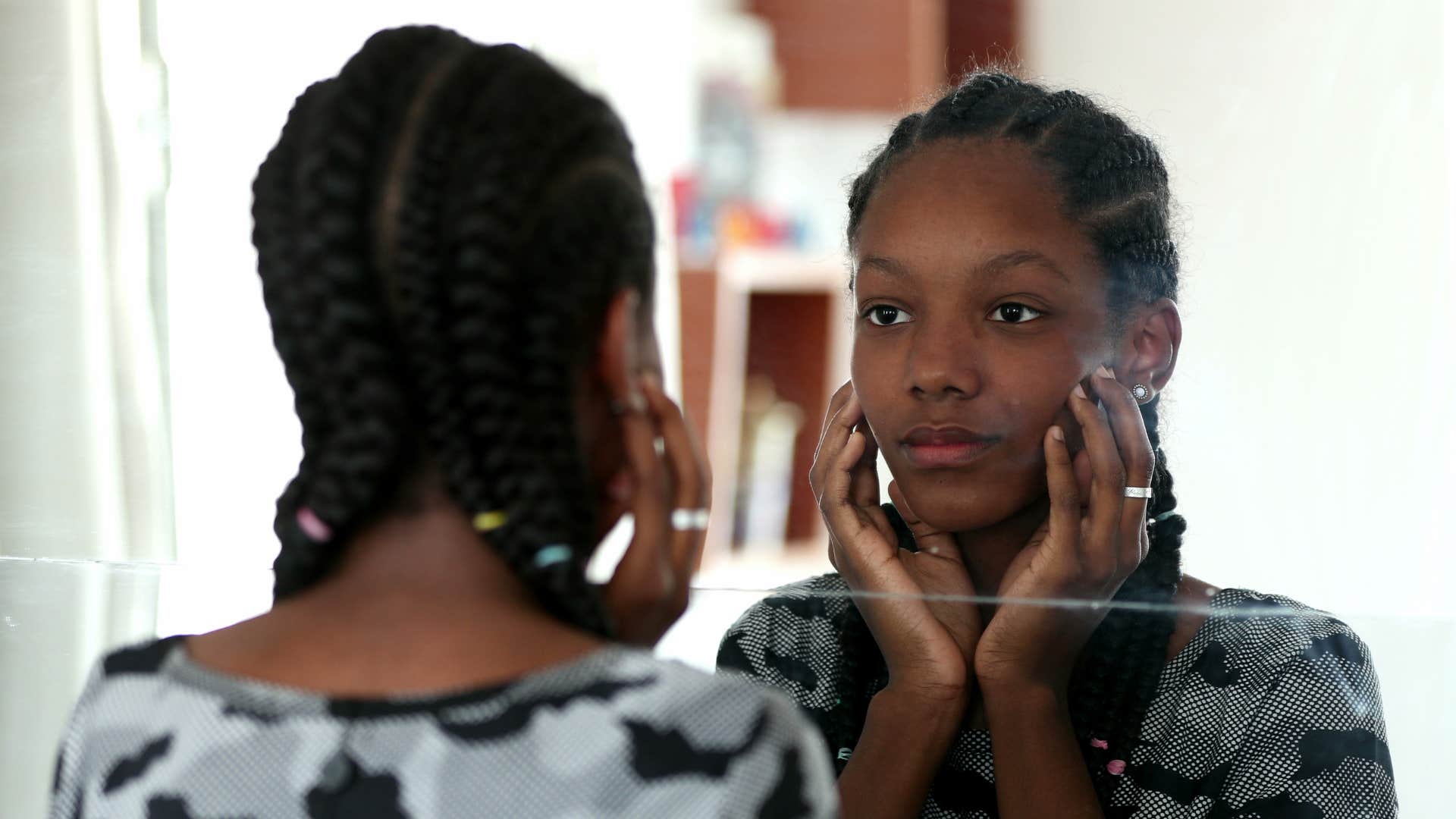11 Signs You Were The Easy Child Growing Up And It Cost You More Than You Realized
Your easygoing nature as a child may have been helpful to your parents, but it's made being an adult a difficult experience.
 Dodokat | Shutterstock
Dodokat | Shutterstock As a child, you were brought up believing that your easygoing nature was something to be celebrated. But despite how good others make it seem, there are signs you were the easy child growing up and it cost you more than you realized, until one day it all clicks. You may have never whined or complained, and always had perfect grades, but regardless of how perfect you were, growing older has left you more confused and uncertain.
From failed relationships to problematic behaviors, your easygoing nature has turned into your greatest downfall, as your inability to say what's on your mind has frustrated and confused those around you. It's unfortunate, but growing up not having your needs met turned you into someone who's content with the bare minimum. And, as a result, while you're content, those around you aren't, costing you quite a lot emotionally and mentally.
Here are 11 signs you were the easy child growing up and it cost you more than you realized
1. You were the peacemaker
 Perfect Wave | Shutterstock
Perfect Wave | Shutterstock
Whenever your family got into it, you found yourself changing your attitude to appease others. From joking around and trying to lift the mood to affirming your parents' beliefs, your actions impacted your home life.
You might not have thought much of how it would impact you at that time, but as you've gotten older, you've come to realize how much being parentified has hurt you. Many kids go through this treatment, as being the family peacemaker often means taking charge of conflict and coming up with resolutions, which is something a parent should be doing.
According to clinical and forensic psychologist Ahona Guha, "The impact of parentification on children can be vast. Parentified children may experience a range of difficulties in adulthood, including: enmeshed roles within the family, difficulties with establishing boundaries, a pervasive need to please other people, anxiety, perfectionism, difficulties forming and maintaining intimate or platonic relationships, missed developmental milestones, grief, and passive styles of communication."
So, if you find yourself struggling in adulthood, take a look at your childhood. You might find that being the easy child comes with a whole list of downsides as an adult.
RELATED: 11 Glaring Signs Of An Entitled Adult Child, Despite Their Parents' Best Efforts
2. You learned how to self-soothe at a young age
 DimaBerlin | Shutterstock
DimaBerlin | Shutterstock
If you had to learn techniques to self-soothe from a young age, it's one of the more subtle signs you were the easy child growing up and it cost you more than you realized. Life hasn't always been fair for you, but because your parents viewed you as easy, they rarely ever came to check on you to make sure you were doing okay.
From counting to 10 to hugging yourself, children who self-soothe often have neglectful parents. Whether it was your parents' intention or not, they thought you could handle life's challenges yourself, causing them to fall back on their role as a caregiver. And you likely found yourself beyond stressed and desperate for love.
Now, as an adult, licensed marriage and family therapist Karyl McBride explained that neglected children have difficulty trusting in relationships. However, it doesn't need to stay this way. "You can define yourself, and live and model a different kind of life and parenting style with your own children," she suggested.
3. You were told you had an old soul
 Chay_Tee | Shutterstock
Chay_Tee | Shutterstock
If growing up someone told you that you had an old soul, you may have interpreted this as being mature. Unfortunately, kids with supposed old souls tend to grow up too fast. Because you had to emotionally and, at times, physically take care of yourself, you likely learned things that most children wouldn't know at your age. In the end, it might have given you valuable survival skills, but there are consequences for children who grow up too fast.
According to psychotherapist Imi Lo, "Since you had to grow up too early too soon, you might be trained to become hyper-independent. You are incredibly self-reliant that it may feel impossible to be vulnerable or seek help from others." Because of this, you might struggle to establish close connections with others, making you feel especially lonely.
4. You avoided conflict at all costs
 New Africa | Shutterstock
New Africa | Shutterstock
If there's one thing you hated, it was getting caught between a rock and a hard place. Whether it was friends arguing or parents arguing, the last thing you wanted was to be involved in any conflict. This is probably why you stayed neutral most of the time and never argued back against your parents.
In essence, you simply didn't want to stir the pot and make the situation worse. And while you might have been looking out for yourself, your avoidance of conflict has cost you a great deal in your adulthood.
As an adult, you struggle with addressing conflict head-on, becoming avoidant of those around you. But struggling to communicate is bound to impact your relationships negatively. According to Dr. Robert Gordon, CPC, a faculty member at American Public University, "Better communication is crucial for building and maintaining relationships, resolving conflicts, and achieving common goals in both personal and professional settings."
5. You were a people-pleaser
 Martin Novak | Shutterstock
Martin Novak | Shutterstock
Being a people-pleaser is one of the incredibly obvious signs you were the easy child growing up and it cost you more than you realized. Unfortunately, being a people-pleaser is one of the most common struggles people deal with. According to a survey from YouGov, 48% of Americans identify as people-pleasers.
However, during childhood, you likely felt the need to conform and, most importantly, make your parents happy. From wanting to avoid conflict to wanting to be noticed, you did your utmost to appeal to your parents by meeting all of their expectations.
At the moment, doing this probably felt like the safest option, but pleasing-people can only get you so far. According to psychotherapist Ilene Strauss Cohen, PhD, "When you strive to meet others' expectations, you lose grip on your emotions, lacking self-regulation. Instead, your focus shifts to pleasing others, effectively living off an emotional credit line. This leaves you open to emotional manipulation by those who exploit this vulnerability."
People-pleasers allow others to set boundaries within the relationship, which can either lead to controlling relationships or even creating distance in them. Either way, continuing on this way is never a good thing.
6. You downplayed your struggles
 Krakenimages.com | Shutterstock
Krakenimages.com | Shutterstock
When people expressed concern for you, without fail you always managed to smile, laugh, and brush it to the side. In your eyes, your concerns and feelings didn't matter. You were just being silly or unreasonable. But all this accomplished absolutely nothing, as downplaying your struggles is bound to lead to some serious emotional suppression.
Suppressing emotions doesn't just keep the negative emotions intact but, arguably, it can also lead to loneliness. According to a study published in Philosophical Transactions of the Royal Society B, loneliness leads to depression, poor sleep quality, impaired executive function, accelerated cognitive decline, poor cardiovascular function, and impaired immunity.
While you might continue to downplay your struggles, even as an adult, be careful. Refusing to express vulnerability will only isolate you from people who care most about your well-being.
7. You felt uncomfortable receiving attention or affection
 New Africa | Shutterstock
New Africa | Shutterstock
Even if a child pretends to be embarrassed by it, every once in a while, a hug from a parent can soothe them. But growing up, you likely felt uncomfortable receiving attention or affection from your parents, and it's negatively affected you into adulthood.
You might not have always been in the mood for a hug, but there's a difference between being in the mood and feeling uncomfortable. If you're not close with your parents or have rarely ever received affection from them, you may feel uncomfortable if they hug you out of nowhere. That being said, if this uncomfortability persists, it could be a problem.
According to associate professor of psychology Nicole K. McNichols, PhD, touch is great for slowing down your heartbeat as it calms down your nervous system. She said, "Human touch also lowers blood pressure as well as cortisol, our stress hormone. It also triggers the release of oxytocin, a hormone known for promoting emotional bonding to others."
8. You were great at reading people
 simona pilolla 2 | Shutterstock
simona pilolla 2 | Shutterstock
When you were a kid, you were likely seen as highly observant by both your teachers and your parents. Being able to pick up on moods at the drop of a hat, many people praised you for your high analytical skills. And even though you were, and maybe still are, good at reading people, it's come with downsides.
As an adult, your keen eye has only gotten sharper in your relationships with others. This is probably why you can tell by someone's tone of voice if they're upset or bothered by something. And while this gift has come in handy, it has also made you completely exhausted as you find yourself always stepping on eggshells.
Do you say what you want to say? Or, do you keep quiet to avoid others getting upset? It's unfortunate, but these conflicting thoughts are the reason why, despite your ability to read people, you choose to remain silent about your own needs and feelings.
9. You judged yourself harshly for little mistakes
 Bricolage | Shutterstock
Bricolage | Shutterstock
Everyone makes mistakes. Even the smartest people will have a mishap that can leave them feeling pretty embarrassed. But these mistakes are meant to be learned from, rather than scolded and cast away. Unfortunately, being highly self-critical is one of the signs you were the easy child growing up and it cost you more than you realized.
While you understand that you are human and are allowed to mess up, this doesn't stop you from criticizing yourself. Growing up, your parents rarely allowed you to make mistakes and likely expected perfection out of you. From a young age, you were taught that to mess up would be met with harsh criticism.
As an adult, you continue to think this way and judge yourself harshly. As a result, your constant negative self-talk has impacted you negatively.
As licensed psychologist Guy Winch, PhD, explained, "The practice of negative self-talk has no utility whatsoever — none. It is purely harmful. It impairs our self-esteem, confidence, sense of empowerment, agency, mastery, competence, motivation, determination, purpose... adds zero value and causes profound psychological, emotional, and cognitive damage."
10. You never had preferences
 Olena Yakobchuk | Shutterstock
Olena Yakobchuk | Shutterstock
Growing up, you likely never had a preference for anything. From the food you ate to the music your parents blasted in the car, you never brought up your likes or dislikes. Because of this, you were likely called the easy child; however, you're realizing later in life that this has negatively impacted you.
On the outside, your parents might not have seen anything wrong with your easygoing nature and were probably relieved that they didn't have to put so much thought or consideration into the food they made or how they planned your birthday party. But what your parents didn't realize is that this easygoing nature wasn't normal. It isn't that you didn't have a preference, you just didn't feel safe to express it.
Your parents probably disregarded your preferences. You never received your favorite toy during the holidays, and you never did anything you asked for on your birthday. Over time, you grew up to assume that your preferences weren't important, leading you to be indecisive as an adult.
11. You never established your authentic self
 fizkes | Shutterstock
fizkes | Shutterstock
Because you spent most of your childhood catering to others, you never once asked yourself who you were or what it was you wanted. Because of this, you now find yourself being a bit of a chameleon as you constantly change yourself depending on who you're hanging out with.
For your friends, you might act mischievous, while for your parents, you might be quieter and mature. Your problem stems from the fact that you don't really know who you are and must change yourself because you have no true identity.
You've never taken the time to figure out your likes, your interests, and your passions. It probably didn't bother you much growing up, but now, it's affecting your ability to establish your authentic, genuine self.
Marielisa Reyes is a writer with a bachelor's degree in psychology who covers self-help, relationships, career, family, and astrology topics.

